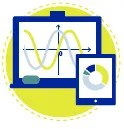Mathematical literacy

In 2022, mathematical literacy will be the focus of the PISA study, as it was in 2003 and 2012.
Mathematical literacy is defined in the PISA study as a person's ability to formulate, process and interpret problems mathematically in a variety of contexts and to reason mathematically. It also includes mathematical reasoning and the use of mathematical concepts, procedures, facts, and tools to describe, explain, and predict phenomena. Mathematical literacy helps individuals recognize and understand the role mathematics plays in the world and make informed judgments and decisions that are necessary to be a constructive, engaged, and reflective citizen. As a result, the items used in the PISA study focus primarily on the application of mathematical knowledge in a variety of real-world contexts. The framework distinguishes between three dimensions, namely content areas, contexts, and processes:
Content areas:
- Quantities
- Uncertainty and data
- Changes and relationships
- Space and shape
Contexts:
- Personal
- Professional
- Public
- Scientific
Processes:
- Formulate
- Employ
- Interpret and Evaluate
You may also refer to the overview of the PISA 2022 Framework for Mathematics (published by the OECD).
Example mathematical literacy items can be found here here.